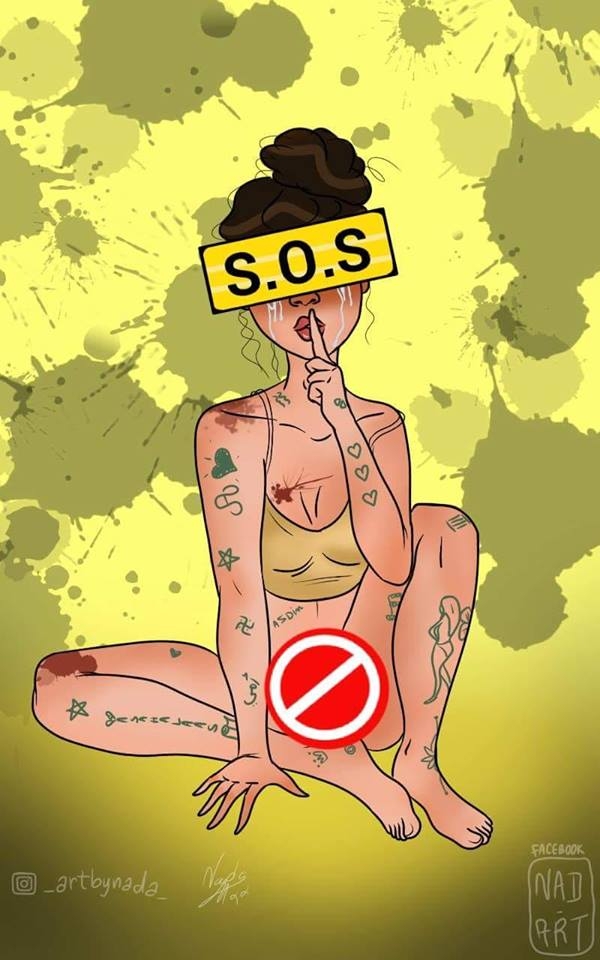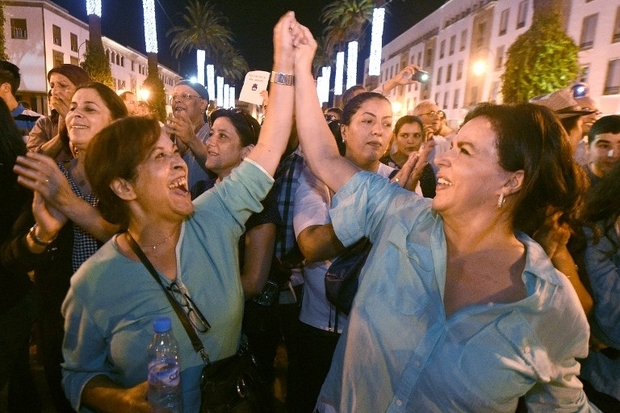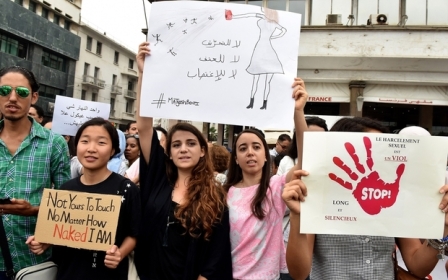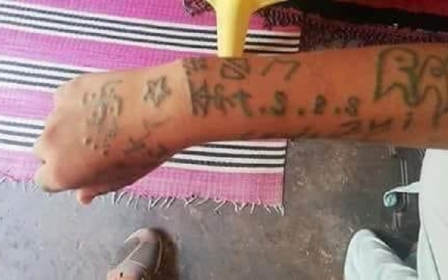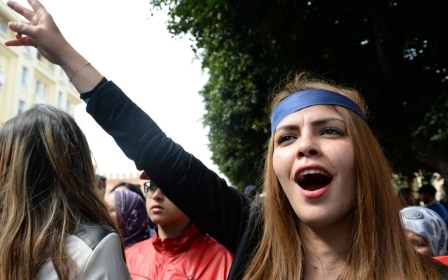From victim to accused: Why rape victims in Morocco suffer double trauma
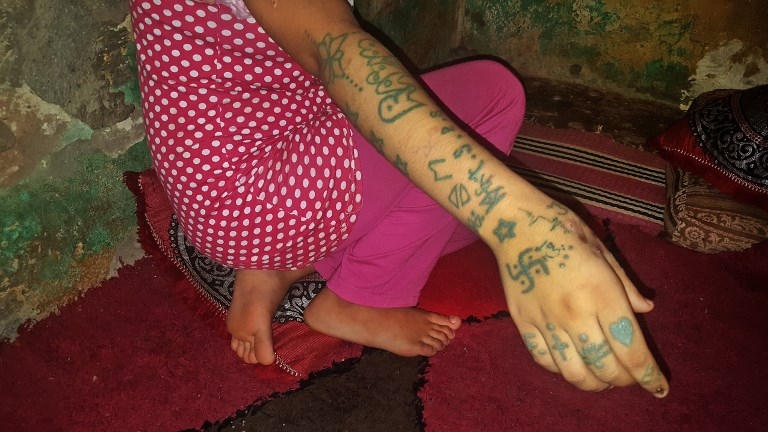
CASABLANCA, Morocco – Her body is scarred for life, mutilated and covered with crude tattoos. Pictures attesting to Khadija Okkarou’s harrowing ordeal have gone viral on social media.
Sequestered, raped, tortured, drugged and tattooed by a gang of 13 youths and men from the town of Oulad Ayad in the Atlas Mountains of central Morocco, the plight of 17-year-old Okkarou is sadly representative of a culture that turns a blind eye to sexual assault. First a victim and now perceived a liar with a depraved lifestyle, the teen is at the heart of a polemic that, in Morocco, is unfortunately nothing new.
Her story was made public on 21 August in an online interview with Chouf TV, in which Okkarou described her ordeal, with her face blurred out.
The horrifying footage, shared widely online, sparked shock and anger across Morocco, with people taking to social media to demand justice with the hashtag #JusticePourKhadija. Accompanied by a picture of a tattoo-covered naked woman with an SOS sign over her face, the hashtag quickly went viral in Morocco and abroad.
The Moroccan author Abdellah Taïa wrote an article entitled “We are all Khadija”, signed by dozens of Moroccan intellectuals and carried by several news outlets in France and Morocco. A petition was created to raise money to help Okkarou “remove the tattoos and also to provide her with emotional and medical support". To date, it has been signed by more than 120,000 people.
The perpetrators immortalised and even celebrated their crime on the victim’s skin. You need to have a very strong sense of impunity to do a thing like that
- Chaima Lahsini, the co-founder of Al-Fam
What many people find particularly distressing about Okkarou’s case - other than the fact that she is a teenager - are the tattoos that cover her neck, legs, hands and arms.
According to Chaima Lahsini, the co-founder of the feminist group Al-Fam, it is “the graphic aspect of the torture inflicted on her” that people find so disturbing.
“The perpetrators immortalised and even celebrated their crime on the victim’s skin. You need to have a very strong sense of impunity to do a thing like that,” she told Middle East Eye.
“We don’t hear much about the psychological impact of violence against women. It’s a taboo subject. In this case, her body is a visual reminder of the destruction [such violence] it can wreak. How could anyone not be outraged, not demand justice after such a thing?”
Zainab Fasiki, an illustrator and a feminist activist, used her social media network to mobilise support in Morocco.
“My friends in Fez and I shared the hashtag with everyone we knew. I also asked around on some of the social media groups I administer for a good dermatologist who did laser tattoo removal,” she told MEE. “People in Morocco have had it with all these accounts of rape. They happen way too often, they’ve become par for the course.”
Public shaming
Despite Okkarou's case engendering widespread public support, relatives of the accused and others soon came forward to cast aspersions on her character and her so-called “loose morals” - sadly, this is the norm in such cases.
In another online video with Chouf TV, the mother of one of the indicted teenagers claimed her son was innocent, saying Khadija had several boyfriends, that she had run away from home and was known around town for her reprehensible behaviour. The girl had done the tattoos herself, she said.
Her version was corroborated by Linda Paradis, the owner of a tattoo removal business, who claimed that the tattoos had been done more than two months ago.
Translation: "Look how small he is, think he's capable of rape," screams a woman present.
Shortly afterwards, a crowdfunding campaign, which raised 2,240 euros ($2,600) for “Khadija to receive medical attention to have the barbaric tattoos removed” was closed. “After the latest disclosures we have decided to stop the campaign until the court ruling is in,” its initiator declared.
Khadija had gone from the status of victim to that of liar with a depraved lifestyle, as had many women before her, including Zinab, a mentally ill girl whose assault on a Casablanca bus was filmed and shared widely.
Although the footage shocked the kingdom, Zinab was quickly branded a runaway with loose morals.
Another teenage girl, who suffered an assault in a widely circulated video posted last May, was also publicly shamed. The girl was on her way to school when she was assaulted by two boys on a scooter. Although she was wearing a veil, some members of the public highlighted that her jeans were tight-fitting and that this meant the assault was justified.
According to Sanaa El Haji, a sociologist and editor for Marayama.com, a debate platform that co-signed Taïa’s column, there is a propensity in Morocco to accept any version of the facts so long as they discredit the women who have been raped.
So basically, if you are not a virgin and you don’t wear a hijab, you’re a valid candidate for rape?
- Zainab Fasiki, illustrator and a feminist activist
“It’s always the same old story, as if not being a virgin or wearing overly tight trousers make it okay for women to be abused. With the Zinab case, one website even went so far as to claim she had AIDS, that the real victims were the assailants!” the sociologist exclaimed.
According to Fasiki, this kind of counterspeech has a definite influence on certain audiences.
“A number of men who had initially expressed their support went on to change sides when they found out that she [Zinab] had already had sex. I received lots of hate messages saying she was responsible for what had happened to her … So basically, if you are not a virgin and you don’t wear a hijab, you’re a valid candidate for rape?”
Patriarchal society
The argument that men cannot be held accountable for their actions is even upheld by the courts at times, and those accused of such crimes often avoid punishment, with their victims left to suffer the consequences.
Take the case of Nassima al-Horr, who committed suicide last August in Marrakech after the acquittal of four men in their 20s accused of raping her when she was 15.
“This patriarchal Muslim society of ours,” Lahsini said, referring to Morocco’s systematic exoneration of men, “is unable to admit the idea of male guilt. Men believe they have the right to satisfy their sexual needs with any woman who isn’t a virgin.”
Samia Lamrani, a member of the Beni Mellal chapter of INSAT, an association against violence against women founded in 2005, said that cases like Okkarou’s were quite common in the region.
“There have been 160 cases of reported sexual assault since we first opened,” she told MEE. “And that number obviously doesn’t reflect all of the other cases that were hushed up because of the shame families feel for their daughters.”
Women are increasingly “being held accountable, and sexual assault trivialised,” El Haji added. “We will use any excuse we can to defend the actions of men. But we are always telling women that they were raped at night, because they were out at night, that they were raped at the beach, because they were half naked.”
After five years of heated debate, a law on the prevention of violence against women entered into effect on 13 September. The text, however, is heavily criticised by most Moroccan women’s rights groups. According to a survey conducted last June by Mobilising for Rights Associates (MRA), 50 percent of these groups claim the measures passed by parliament are not enough.
Human Rights Watch has pointed to the law's stipulation that survivors of sexual assault must file for criminal prosecution in order to obtain protection, and highlighted that is does not set out duties of prosecutors, police and investigative judges in domestic violence cases, or fund shelters for women.
The number of rape cases handled by the Moroccan judiciary doubled in 2017, rising from an average of 800 to 1,600. In the case of Okkarou, 12 of the suspects have been arrested by local authorities and an investigation is currently under way. The preliminary hearing slated for 6 September was adjourned to 10 October.
Yet the verdict aside, Lamrani believes that Okkarou and her assailants will each, to some extent, continue to be “victims of Moroccan society […] who, like most of the people in the region, were raised in ignorance and poverty.”
- The article is based on an a translation of a story that was originally published by Middle East Eye's French website.
New MEE newsletter: Jerusalem Dispatch
Sign up to get the latest insights and analysis on Israel-Palestine, alongside Turkey Unpacked and other MEE newsletters
Middle East Eye delivers independent and unrivalled coverage and analysis of the Middle East, North Africa and beyond. To learn more about republishing this content and the associated fees, please fill out this form. More about MEE can be found here.


